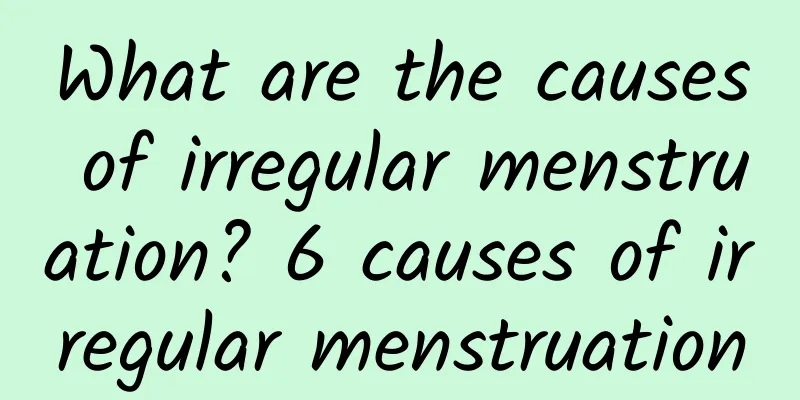What are the causes of irregular menstruation? 6 causes of irregular menstruation

|
Irregular menstruation is also very common under normal circumstances. It is a common gynecological disease in women. The main manifestations are too little or too much menstruation. Irregular menstruation not only affects the patient's normal life, but also has serious effects on pregnancy and health. Let us understand. Causes of irregular menstruation 1. Irregular work and rest schedule. Due to the influence of life or work, people often stay up late or have an irregular work and rest schedule. This bad work and rest habit can easily lead to endocrine disorders and cause irregular menstruation. 2. Excessive weight loss. Uncontrolled weight loss or excessive exercise will lead to insufficient protein and fat intake in the body, affecting the normal synthesis of estrogen in the body, leading to oligomenorrhea or amenorrhea. 3. Emotional factors: If you are depressed, anxious or under great mental stress for a long time, the function of the hypothalamus will be damaged, the ovaries will not be able to secrete hormones and ovulate, which can easily lead to irregular menstruation. 4. Abortion. Multiple abortions can lead to a thin endometrium, uterine damage that is difficult to repair, and even irregular menstruation, amenorrhea, and infertility. 5. Uterine fibroids. Women with uterine fibroids usually have irregular menstruation, mainly manifested by heavy menstrual flow and prolonged menstrual periods. The severity of the symptoms depends on the pathology of the uterine fibroids. 6. Thyroid problems: If the thyroid function is hyperactive or hypoactive, it will also affect the ovarian function and cause irregular menstruation. 7. The impact of IUD. IUD is a foreign body outside the body, which can stimulate the endometrium of women and cause irregular menstruation, amenorrhea, etc. Symptoms of irregular menstruation 1. Amenorrhea: Long-term menstrual irregularities may lead to amenorrhea. The patient will have pale or yellow complexion, mental fatigue, dizziness, palpitations, insomnia, weakness in the limbs, pale tongue, and deep and thin pulse. 2. Oligomenorrhea: refers to scanty menstruation that stops after 1-2 days or stops with a few drops of fluid. Symptoms include light red menstruation, dull complexion, dry skin, dizziness, palpitations, empty pain in the lower abdomen, cold hands and feet, pale tongue, and weak pulse. 3. Menorrhagia: refers to excessive menstruation, which is overdue and caused by the blood disorder caused by qi deficiency. Common symptoms include light red menstrual color, light menstrual quality, empty lower abdomen, fatigue, dull complexion, palpitations, shortness of breath, lazy speech, light red tongue with thin white fur, and weak pulse. 4. Menstrual blood color: Normal blood is dark red, mixed with small fragments of shed endometrium, cervical mucus, vaginal epithelial cells, and no blood clots. If the menstrual blood is as thin as water, with only a little pink or black and purple, this is abnormal. If the menstrual blood is completely clotted blood, it is also abnormal, and there may be other bleeding sites. You should see a doctor as soon as possible to ensure your health. 5. Early menstruation: Early menstruation refers to a shortened menstrual cycle, shorter than 21 days, and more than 2 consecutive cycles, which is based on ovulatory dysfunctional uterine bleeding, menstrual irregular temperature biphasic. The follicular phase is short, only 7-8 days, or the luteal phase is shorter than 10 days, or the body temperature rises by less than 0.5℃. 6. Irregular menstruation: menstruation is early or late, and the cycle is shorter than 21 days or 35 days. Treating irregular menstruation 1. Mainly Chinese medicine conditioning In the treatment of irregular menstruation, we must carry out dialectical treatment according to each person's physical condition, by regulating qi, blood, blood stasis, and supplementation, regulating the functions of various female organs, and regulating endocrine balance. 2. Physical therapy supplemented with secretion balance therapy This treatment method for irregular menstruation can quickly eliminate metabolic congestion in the patient's body, balance Qi and blood, and bring the secretion levels of estrogen and progesterone to the optimal physiological state. It has a unique effect in regulating women's irregular menstruation. 3. Try to keep your life regular Staying up late, overwork, and irregular life can all lead to irregular menstruation. Make your life regular and your menstruation may return to normal. See a doctor if necessary If bleeding continues without stopping after 24 hours, and the amount of bleeding is heavy, or there is missing menstruation, you should seek medical attention immediately. 5. Prevent cold During menstruation, you must be careful not to wade in the rain, and avoid exposing your lower abdomen to cold at all times. |
<<: What is the treatment for irregular menstruation? 4 causes of irregular menstruation
Recommend
How long does it take to have normal menstruation after a miscarriage? What are the reasons for delayed menstruation after a miscarriage?
The question that people who have had miscarriage...
Is abdominal pain a symptom of uterine fibroids? Are patients with depression more likely to develop uterine fibroids?
At present, uterine fibroid disease is more and m...
Patients should pay attention to the precautions after ectopic pregnancy surgery
Nowadays, many women are prone to ectopic pregnan...
How to regulate the diet of patients with dysmenorrhea
For patients with dysmenorrhea, how to regulate d...
People should pay attention to the symptoms of cervical hypertrophy in time
Cervical hypertrophy brings a lot of troubles to ...
How are uterine cysts formed? What are the symptoms?
The formation of uterine cysts may involve a vari...
What are the diagnostic criteria for uterine fibroids?
The clinical manifestations of uterine fibroids o...
Study: Eating the right oils can help prevent body fat accumulation
The series of food safety scandals have made the ...
What harm will frequent abortion do to the body? Introduction to several common harms of frequent abortion
What are the harms of frequent abortion to the bo...
Girls love sports! 3 tips to avoid iron legs
Sports awareness is on the rise. Taking advantage...
Is it normal for vaginal discharge to be a little light brown? It may be physiological
The change in the color of a woman's vaginal ...
Fight body fat! Drink 3 fat-burning teas at the right time
Compared with losing weight, reducing body fat is...
How big is the uterine fibroid and how long does it take to remove it surgically?
Generally, surgery is recommended when the diamet...
How to treat uterine fibroids in the short term? Medication methods for uterine fibroids
Western medicine treatment is generally only suit...
What are the causes of uterine fibroids? Can drug abuse also cause uterine fibroids?
Uterine fibroids are the most common gynecologica...









